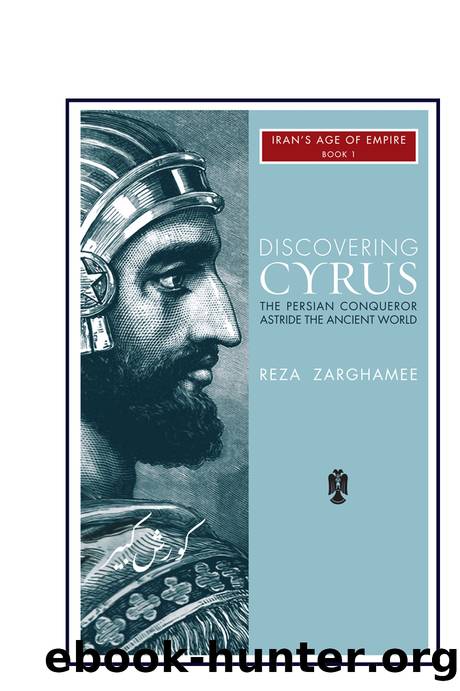Discovering Cyrus: The Persian Conqueror Astride the Ancient World by Reza Zaghamee;

Author:Reza Zaghamee;
Language: eng
Format: epub
Publisher: Lightning Source Inc. (Tier 3)
Published: 2014-06-04T00:00:00+00:00
EPILOGUE
Cyrusâ Legacy
The Persians under Cyrus, possessing the proper amount of servitude and freedom, began by becoming free and then became rulers over many others. For the rulers shared their freedom with the ruled and drew toward equality; as a result the soldiers felt more friendly toward their generals and faced danger with eager spirits. Moreover, if someone among them was prudent and capable of giving counsel, the king was not jealous but allowed freedom of speech and honored those capable of giving counsel; hence a man was willing to share his capacity, in their midst, as something common. Everything prospered for them in those days because of freedom and friendship and a common sharing of intelligence.
âPlato, Laws
Cyrus was a warrior, statesman, and administrator of the highest order â a man of tremendous vision, with the charisma and determination to single-handedly change the course of history. To be these things, Cyrus had to be attuned to the sociopolitical climate of the world in which he lived. During the sixth century bce, the inhabitants of the Near East were spiritually exhausted.1 Many had endured centuries of harsh rule under the militaristic Assyrian Empire and its successor states. Others had suffered from the traumatic invasions of the steppe nomads, who, a little more than a century before Cyrus, had ridden roughshod over all the countries between Bactria and Lydia. These victimized peoples desired what Cyrus ultimately gave them: political stability, local autonomy, and protection against marauding tribes. So great was their need that, for many nations, the acceptance of Persian rule was but a small price to pay. This contributed to both the rapid expansion and stable existence of the Achaemenid Empire for over two centuries.
The Persian Empire that Cyrus founded touched more lives than any state to precede it and the motivations underlying its policies were, of course, complex. Relations with subject peoples entailed both patronage and exploitation, reciprocal exchange and coercion, genuine care and opportunistic propaganda. However, in assessing toward which side of the ledger the Persians generally tended, we can hardly dismiss the positive reputation that Cyrus and a number of his successors garnered among the members of so many different societies. One telling indication of the unique political order heralded by Cyrusâ conquests involved the heightened national consciousness of the various peoples who lived under the rule of the Persians or who otherwise interacted with them. Whereas in earlier days the Assyrians had sought to break the national spirit of conquered peoples through the practice of population deportation and religious oppression, and whereas the later Greeks and Romans sought to impose their native educational systems upon their foreign subjects, Cyrus and his successors accepted the cultural diversity of their empire. Indeed, the policies of the Achaemenids proved pivotal to the development of a firm national identity among many of the peoples they governed, including the Iranians themselves.
Cyrusâ enlightened approach to imperial rule reveals a high-mindedness shared by the great thinkers of the so-called âAxial Age.â This is the
Download
This site does not store any files on its server. We only index and link to content provided by other sites. Please contact the content providers to delete copyright contents if any and email us, we'll remove relevant links or contents immediately.
| Bahrain | Egypt |
| Iran | Iraq |
| Israel & Palestine | Jordan |
| Kuwait | Lebanon |
| Oman | Qatar |
| Saudi Arabia | Syria |
| Turkey | United Arab Emirates |
| Yemen |
Empire of the Sikhs by Patwant Singh(23070)
The Wind in My Hair by Masih Alinejad(5091)
Rise and Kill First by Ronen Bergman(4778)
The Templars by Dan Jones(4681)
The Rape of Nanking by Iris Chang(4202)
12 Strong by Doug Stanton(3541)
Blood and Sand by Alex Von Tunzelmann(3194)
Babylon's Ark by Lawrence Anthony(2671)
The History of Jihad: From Muhammad to ISIS by Spencer Robert(2618)
No Room for Small Dreams by Shimon Peres(2362)
The Turkish Psychedelic Explosion by Daniel Spicer(2353)
Inside the Middle East by Avi Melamed(2349)
Gideon's Spies: The Secret History of the Mossad by Gordon Thomas(2337)
Arabs by Eugene Rogan(2292)
The First Muslim The Story of Muhammad by Lesley Hazleton(2263)
Come, Tell Me How You Live by Mallowan Agatha Christie(2249)
Bus on Jaffa Road by Mike Kelly(2150)
1453 by Roger Crowley(2022)
Kabul 1841-42: Battle Story by Edmund Yorke(2021)
